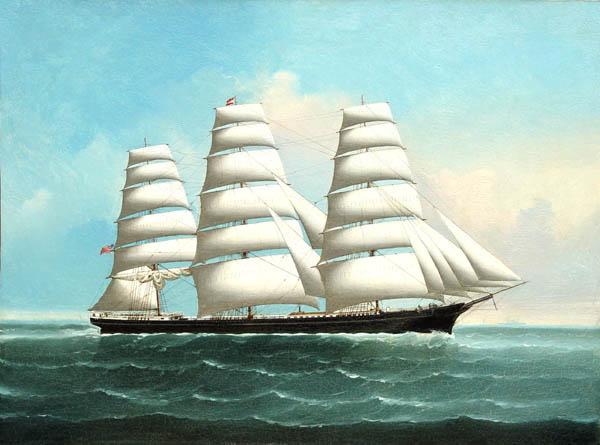
Source: Sarah Vowell, spoglia, Flickr
Now, it’s your turn to use what you have learned about style and syntax to analyze an excerpt from Frederick Douglass’s autobiography Narrative of The Life of Frederick Douglass, An American Slave. Read the paragraph below and then answer the questions that follow. In this paragraph, Douglass is talking to the ships that he can see on the Chesapeake Bay from the plantation where he is held as a slave.
You are loosed from your moorings, and are free; I am fast in my chains, and am a slave! You move merrily before the gentle gale, and I sadly before the bloody whip! You are freedom’s swift-winged angels, that fly round the world; I am confined in bands of iron! O that I were free! O, that I were on one of your gallant decks, and under your protecting wing! Alas! betwixt me and you, the turbid waters roll. Go on, go on. O that I could also go! Could I but swim! If I could fly! O, why was I born a man, of whom to make a brute! The glad ship is gone; she hides in the dim distance. I am left in the hottest hell of unending slavery. O God, save me! God, deliver me! Let me be free! Is there any God? Why am I a slave? I will run away. I will not stand it. Get caught, or get clear, I’ll try it. I had as well die with ague as the fever. I have only one life to lose. I had as well be killed running as die standing. Only think of it; one hundred miles straight north, and I am free! Try it? Yes! God helping me, I will. It cannot be that I shall live and die a slave. I will take to the water. This very bay shall bear me into freedom. The steamboats steered in a northeast course from North Point. I will do the same; and when I get to the head of the bay, I will turn my canoe adrift, and walk straight through Delaware into Pennsylvania. When I get there, I shall not be required to have a pass; I can travel without being disturbed. Let but the first opportunity offer, and, come what will, I am off. Meanwhile, I will try to bear up under the yoke. I am not the only slave in the world. Why should I fret? I can bear as much as any of them. Besides, I am but a boy, and all boys are bound to someone. It may be that my misery in slavery will only increase my happiness when I get free. There is a better day coming.
 Use your notes to answer the following questions. When you are finished, check your understanding to see possible responses.
Use your notes to answer the following questions. When you are finished, check your understanding to see possible responses. - Are there any particularly long sentences? What effect do they have?
- Are there any short sentences? What effect do they have?
- Explain the questions “Is there any God?” and “Why am I a slave?” and the answer “I will run away.”
- Do any of the sentences have an unusual or distinctive word order? What effect does that have?
- What conclusion can you draw from the sentence structure?
Sample Responses:
- Yes. “You are loosed from your moorings, and are free; I am fast in my chains, and am a slave! You move merrily before the gentle gale, and I sadly before the bloody whip!” and “You are freedom”s swift-winged angels, that fly round the world; I am confined in bands of iron!” The first parts of these three sentences convey a sense of freedom because of their sense of movement. The verbs “loosed,” “move,” and “fly” support the idea of movement in the sentences. “Swift-winged angels” also support the ideas of freedom and movement. In contrast, the word “fast” means “tight”; he can’t move. His is also “confined.” These words convey a sense of opposition and show Douglass to be a slave.
- Yes. “Go on, go on.” “I will run away.” “I will not stand it.” They are simple, declarative, and forceful.
- Douglass asks if God exists because he has just been begging God for help. He asks why he is a slave because he knows that there is no good answer. The answer is complicated and not complicated at the same time. He is a slave because he was born black. A simple question deserves a simple answer. Since there is no good reason for him to be a slave, he “will run away.”
- “Could I but swim!” is poetic, but it also shows that he’s searching for any answer to get him to freedom. Some sentences read like poetry, especially the ones that begin with “O!” These seem to be a cry to God or to himself, and they are combined with other sentences that suggest activity or movement.
- He seems to be frantic in the first part of the excerpt as he looks at the ships and thinks about how to achieve his own freedom. In the last part of the excerpt, he seems to be more accepting; he has a plan that he describes. Most of the sentences begin with “I” as he relates his plan for escape.